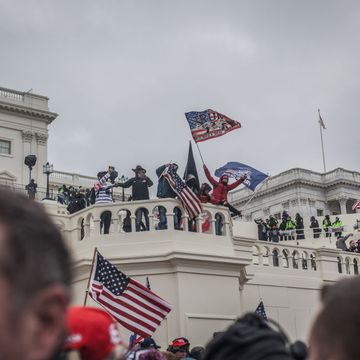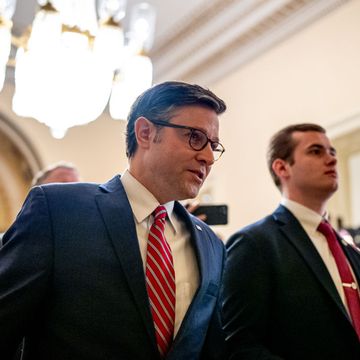After the attacks on Paris, the response of the Western World has been depressingly predictable. Initial shock and sadness gave way to inchoate rage and an overwhelming desire to hit out. The French President's first remark was that the attacks constituted an act of war and that the French response would be "pitiless." As I write, French planes are already attacking ISIS strongholds. It is unclear what anyone imagines will be accomplished by this aggression. War in the Middle East is like The Sorcerer's Apprentice. Every time you hack ISIS soldiers to pieces, a thousand more bastards rise up. The U.S. Military employed in the Middle East over the past decade and a half has been one of the best trained, best armed, best prepared, most dedicated military forces in history. If they couldn't solve the problem by force, why do we imagine we can now?
I have lived my whole life in the shadows of exactly the kind of reaction to terrorism the Paris attacks have provoked, and the waste of life is verging, now, on the sacrilegiously stupid. They attack. People die. The oversize military forces respond. The security services increase surveillance. The enemy grows more ferocious, more loathsome, more difficult to deal with. Don't misunderstand my pacifism: If we could eradicate every last one of those slave-owning rapists and solve the problem that way, we should. But we have been walking this same path for 15 years, and nothing would ensure the triumph of the Paris attacks more than a serious military intervention against them. Surely at this point, we have to recognize that we are fighting the wrong war, that we are bringing bayonets to face machine guns, and cavalry to face tanks.
ISIS does not fear F-18s. F-18s can only kill them. And what they want is death and to be remembered in death. ISIS is only tangentially a military force; it is above all a media force which requires military force to create its performances. ISIS can field about 30,000 men. That's about one-seventieth the manpower of the current U.S. force. ISIS continues to triumph because it has mastered soft power. We think that hard power trumps soft power, that ultimately the power of suggestion and the power of the media are secondary to military force. But it is a lot harder to kill beliefs than to massacre people.
ISIS is utterly devoted to soft power. The difference between ISIS and al-Qaeda is that ISIS came to fame largely on their incredible series of recruitment videos. I reviewed one, the Clanging of the Swords 4, long ago, before we even knew their name. That movie was indistinguishable from snuff pornography. It was drone-enabled 360 degree go-pro death cult fantasy. Their use of social media and viral content is nonpareil. They have a store selling gear. They have a magazine. As NBC reported yesterday, they have a 24-hour hotline open to anyone who wants to commit terrorist attacks.
So ISIS takes pop culture, or soft power, very very seriously indeed, even if we don't. The attacks on Paris demonstrate their cultural focus most of all. They attacked restaurants, theaters, and sports events rather than military or political targets. Bono described it as "the first direct hit on music." More are, without question, on the way. They are truly cultural warriors.
So what is the proper way to wage war on ISIS culturally? Obviously, the Obama administration is fully aware of the need for "digital war" through Arab social media accounts. And I don't think we should sneer at Anonymous stepping up to attack ISIS. They are at least on the correct battlefield. The forces that will defeat ISIS aren't the army, the navy, and the air force; they're Twitter, Facebook, and YouTube. They have to involve themselves in the war.
Like mass shooters, we have to stop converting terrorists into celebrities of evil. They don't mind being evil, but they want to be celebrities. Abdel-Hamid Abu Oud is being described as a "mastermind" already. As if it takes some kind of genius to get your hands on a couple of machine guns and blow away a hundred innocent civilians. We call him a "mastermind" because we want the assurance of a recognizable enemy, an enemy from our story books. The truth is much more banal: Evil children committed violence out of monstrous stupidity.
The media does not like to think of itself as responsible for the events of the world. And usually it isn't. A new Poynter study showed that the image of the dead Syrian boy on the beach shocked the world but not for long. The effect was intense but ebbed quickly. The power of the media can nonetheless be real. Papers do not report on suicides, for example, because of the fact that suicides spike when the media reports on them. It's called the "Werther effect." It is time for reporting on ISIS to take on similarly responsible practices, and for Facebook and Google to do the same.
Our stories have consequences. I hope that Paul Ryan, deep in his heart, or at least in some small corner of where his heart might have been, recognizes that saying he wants to prevent Syrian refugees from entering America is exactly the triumph that ISIS was looking for. Every time a mosque is burned by some Islamophobe in response to the attacks, ISIS wins. Every time the hate spreads, ISIS wins. To make ISIS lose, you have to make the hate stop. You have to stop the hate from growing. I know that sounds flaky, but we've tried the opposite for 15 years. We've tried being hard. Now is the time to be soft.














